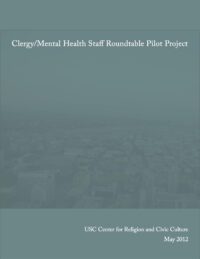Based on the data obtained from the interviews, we provide the following recommendations to build on and increase the successes of the Roundtables:
- Seek broader representation of religious groups in future Roundtables. Despite the fact that the Los Angeles region is the most religiously diverse area in U.S., only three religious groups were represented in the Roundtables: Protestant, Catholic and Jewish. This may mean that multiple Roundtables in each SPA need to be developed, based on the communities within the SPA that are represented by the participants.
- Expand the Roundtable model to multiple Roundtables in each SPA, and to additional SPAs if possible. Related to recommendation #1, establishing Roundtables across a broader geographic area within each SPA would also expand religious and racial/ethnic representation. In other words, the Roundtables should “look” like the communities in which they are located.
- Increase participation in the Roundtable from MH staff with direct client contact. Several MH staff were administrators who mentioned that the Roundtables would have benefitted from more MH staff with direct contact with clients.
- Commit to a specific methodology of interviewing and screening participants, emphasizing clear communication about the intent and goals of the Roundtables. A commitment to such a methodology would decrease the likelihood of participants having different motives for participation than the stated goals of the Roundtables, and would also serve to increase the likelihood that all parts will be understood and anticipated when the Roundtable is underway.
- Continue to include “burning issues” discussions as a regular part of the Roundtables. All Roundtable participants experienced this as an important part of the project and provided them with a tangible benefit for attending. This also provides “ownership” over the topics and discussion of each Roundtable session for all participants, which in turn, should deepen their commitment to the Roundtable and to maintaining the relationships they have developed.
- Build on the initial successes of the Roundtables of providing mutual support, relationship building and opportunities to develop consultations and referrals, to developing models of collaborative care based on insights gleaned from Roundtable discussions. Several participants, including both clergy and MH staff, noted their desire to put their discussions into action and start to develop these models of collaborative care.
- Build on the relationships developed between MH staff and clergy to utilize these relationships and the networks that clergy represent as ways for DMH to deliver educational material, resource information, etc. deeper into the communities it serves. While it is important for individual clergy to be a part of the Roundtables, it is also important for DMH to think of clergy as representing community networks to which they may not currently have access. Thus, clergy and their network relationships with other faith and community leaders represent an opportunity for DMH to reach deeper into communities with mental health services, education, and the like.
- Related to recommendation #7, the Roundtables should make DMH materials routinely available to participants. This will encourage clergy to become more informed about DMH programs and resources, and will also provide them with material they can distribute through their networks.
- Because the Roundtable program is oriented around religion and mental health issues, it would be important for the Roundtables to have at least one session early on in the process that was dedicated to members (whether clergy or MH staff) talking about the religious tradition to which they belong, including if they do not belong to any religious tradition. This would allow all participants to express not only their understanding of their own tradition (or no religious tradition), but to learn from others about their tradition, highlighting commonalities as well as differences, boundaries, and points of convergence between their different traditions within the context of improving mental health offerings and resources.
To see the Appendix with the Evaluation Survey Instrument, please download the PDF of this report.
